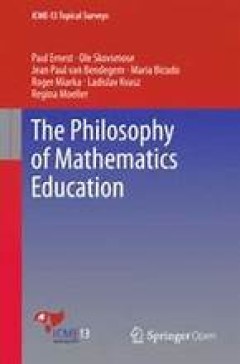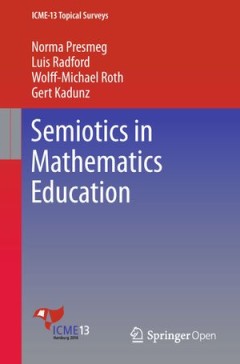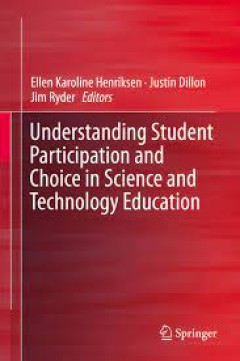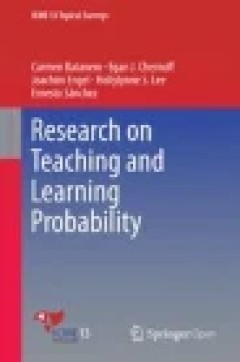Filter by

The Philosophy of Mathematics Education
This survey provides a brief and selective overview of research in the philosophy of mathematics education. It asks what makes up the philosophy of mathematics education, what it means, what questions it asks and answers, and what is its overall importance and use? It provides overviews of critical mathematics education, and the most relevant modern movements in the philosophy of mathematics. …
- Edition
- 1
- ISBN/ISSN
- 978-3-319-40569-8
- Collation
- -
- Series Title
- ICME-13 Topical Surveys
- Call Number
- 510

Semiotics in Mathematics Education
Mathematics Education
- Edition
- -
- ISBN/ISSN
- 9783319313696
- Collation
- VII, 40 halaman
- Series Title
- ICME-13 Topical Surveys
- Call Number
- 510 PRE s

Understanding Student Participation and Choice in Science and Technology Educ…
Drawing on data generated by the EU’s Interests and Recruitment in Science (IRIS) project, this volume examines the issue of young people’s participation in science, technology, engineering and mathematics education. With an especial focus on female participation, the chapters offer analysis deploying varied theoretical frameworks, including sociology, social psychology and gender studies. …
- Edition
- -
- ISBN/ISSN
- 978-94-007-7793-4
- Collation
- -
- Series Title
- -
- Call Number
- -

Assessment in Mathematics Education: Large-Scale Assessment and Classroom Ass…
This book provides an overview of current research on a variety of topics related to both large-scale and classroom assessment. First, the purposes, traditions and principles of assessment are considered, with particular attention to those common to all levels of assessment and those more connected with either classroom or large-scale assessment. Assessment design based on sound assessment prin…
- Edition
- Ed. 1
- ISBN/ISSN
- 978-3-319-32394-7
- Collation
- IX, 38
- Series Title
- ICME-13 Topical Surveys
- Call Number
- 371.26 ASS a

Invited Lectures from the 13th International Congress on Mathematical Education
Mathematics Education; Mathematics Learning; Mathematics Teaching; Mathematics Teachers; ICME-13; 13th Congress on Mathematical Education; Empirical Studies in Mathematics Education; Theoretical Reflections on Mathematics Education; Tertiary Mathematics Education; Secondary Mathematics Education; Primary Mathematics Education; Society of Didactics of Mathematics; Mathematics Educators; Improvem…
- Edition
- -
- ISBN/ISSN
- 9783319721705
- Collation
- -
- Series Title
- -
- Call Number
- -

Research On and Activities For Mathematically Gifted Students
This open access Topical Survey offers a brief overview of the current state of research on and activities for mathematically gifted students around the world. This is of interest to a broad readership, including educational researchers, research mathematicians, mathematics teachers, teacher educators, curriculum designers, doctoral students, and other stakeholders. It first discusses research …
- Edition
- Ed. 1
- ISBN/ISSN
- 978-3-319-39450-3
- Collation
- -
- Series Title
- -
- Call Number
- -

Research in Mathematics Education in Australasia 2012-2015
With the ninth edition of the four-yearly review of mathematics education research in Australasia, the Mathematics Education Research Group of Australasia (MERGA) discusses the Australasian research in mathematics education in the four years from 2012-2015. This review aims to critically promote quality research and focus on the building of research capacity in Australasia.
- Edition
- Ed. 1
- ISBN/ISSN
- 978-981-10-1419-2
- Collation
- -
- Series Title
- -
- Call Number
- -

Research on Teaching and Learning Mathematics at the Tertiary Level
This topical survey focuses on research in tertiary mathematics education, a field that has experienced considerable growth over the last 10 years. Drawing on the most recent journal publications as well as the latest advances from recent high-quality conference proceedings, our review culls out the following five emergent areas of interest: mathematics teaching at the tertiary level; the role …
- Edition
- Ed. 1
- ISBN/ISSN
- 978-3-319-41814-8
- Collation
- -
- Series Title
- -
- Call Number
- -

Research on Teaching and Learning Probability
This book summarizes the vast amount of research related to teaching and learning probability that has been conducted for more than 50 years in a variety of disciplines. It begins with a synthesis of the most important probability interpretations throughout history: intuitive, classical, frequentist, subjective, logical propensity and axiomatic views. It discusses their possible applications, p…
- Edition
- Ed. 1
- ISBN/ISSN
- 978-3-319-31625-3
- Collation
- -
- Series Title
- -
- Call Number
- -

Approaches to Qualitative Research in Mathematics Education: Examples of Meth…
This volume documents a range of qualitative research approaches emerged within mathematics education over the last three decades, whilst at the same time revealing their underlying methodologies. Continuing the discussion as begun in the two 2003 ZDM issues dedicated to qualitative empirical methods, this book presents astate of the art overview on qualitative research in mathematics education…
- Edition
- Ed. 1
- ISBN/ISSN
- 978-94-017-9181-6
- Collation
- XV, 592
- Series Title
- Advances in Mathematics Education
- Call Number
- 510 APP a
 Computer Science, Information & General Works
Computer Science, Information & General Works  Philosophy & Psychology
Philosophy & Psychology  Religion
Religion  Social Sciences
Social Sciences  Language
Language  Pure Science
Pure Science  Applied Sciences
Applied Sciences  Art & Recreation
Art & Recreation  Literature
Literature  History & Geography
History & Geography